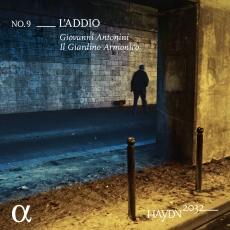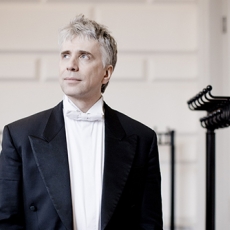Giovanni Antonini & Il Giardino Armonico - Haydn 2032, Vol. 9: L'Addio - The Classic Review
The Haydn 2032 cycle continues with its ninth volume, featuring performances of Symphonies Nos. 15 and 35, as well as No. 45, better known as the “Farewell” Symphony. The album also includes the concert aria “Berenice, che fai?” written towards the end of Haydn’s second London visit (1795). The first eight volumes have been well received, and this latest volume is perhaps the best thus far.
Il Giardino Armonico is uniformly impressive, playing with remarkable unanimity of attack and blend from all sections of the orchestra. The strings, by employing a satisfying array of colors, bow strokes and articulation, reveal a sophisticated richness to Haydn’s writing that is experienced only sporadically in earlier recordings of these works by Hogwood (Decca) and Goodman (Hyperion). Winds are just as excellent, and it is thrilling to hear Haydn’s high horn writing played with such confident verve.
Tempos are often on the quick side without ever sounding unduly rushed, a testament to the technical excellence of the players. More impressive still is how Antonini and his players shape the many passages of even eighth-note motor rhythms. In Hogwood’s reading of Symphony No. 35, the opening movement’s relentless motor rhythm soon grows tiresome, but Il Giardino Armonico’s players subtly shape each line, ensuring forward momentum that never becomes monotonous. Haydn’s contrapuntal writing is presented with crystalline clarity. In slow movements the melodic line really sings, while fast movements have an uninhibited and engaging joy de vivre.
In Symphonies Nos. 35 and 45, the Minuet movements are conducted one beat per bar, offers the players additional opportunities to display their technical prowess. It makes for thrilling listening (sample the Trio section of No. 35, track 3). In both works I felt the tempo robs the music of some elegance, but perhaps Antonini feels that such gracefulness is more appropriate to Mozart’s style than Haydn’s? Yet in Symphony No. 15 the tempo felt entirely convincing – a reminder that it all comes down to personal taste.
The most thought provoking interpretive idea is heard in the Farewell Symphony’s first movement: in the closing section of the development (track 5, 3’10” and 5’41”), Antonini suddenly adopts a slightly slower tempo and smoother articulation, the established mood of agitated restlessness suddenly shifting to a longing that perhaps foreshadows the closing section of the final movement. On first hearing this felt contrived, but with repeated listening (and the thoughtful explanation provided in the liner notes) I am convinced it is a thoughtful realization of Haydn’s score. The slow movement is another highlight, moving from its opening moments of delicate playfulness to a deep yearning, so touchingly conveyed in the dissonant suspensions of the closing moments (track 6, 8’41”).
“Berenice, che fai?”, coming after the Farewell Symphony, is played for all its worth, Antonini draws out every ounce of drama and Sandrine Piau sings with her customary skill, fully immersing herself (and us) in the protagonist’s desperate anger. The liner notes tell us that this text was set by several composers of the period, but it is hard to imagine a finer setting, especially in this performance, than Haydn’s.
The readings of Symphonies 15 and 35 are particularly successful because Antonini and his players clearly believe in them, considering them to be just as inspired and brilliant as the Farewell Symphony – and as heard here, they are. These performances fully reveal and revel in the ceaseless inventiveness of Haydn’s music.
This series goes from strength to strength. Il Giardino Armonico seems completely at one with this music; their enthusiasm for this life-affirming music is infectious. Notes and artwork are excellent, a distinguished feature of this series. The last major Haydn anniversary left two cycles incomplete and cancelled (Hogwood and Goodman) and I for one am desperate for this cycle to reach the finishing line in 2032.


